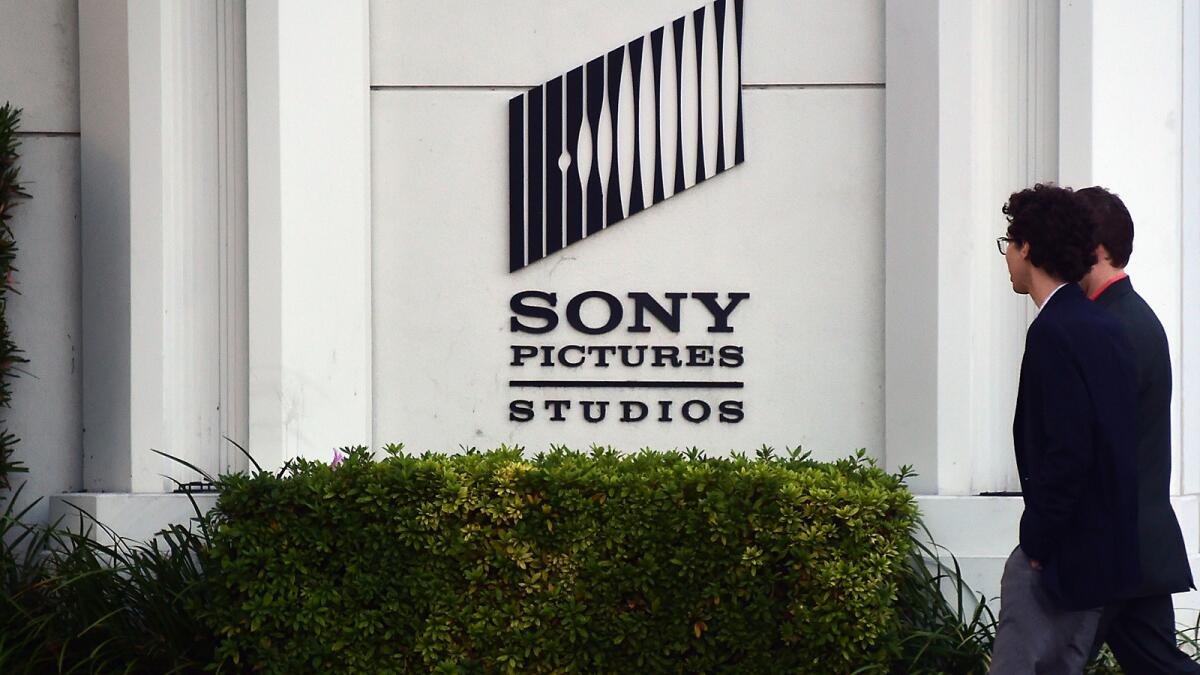Sony calls on media to stop publishing hacked documents

- Share via
Stunned by a massive leak of sensitive documents, Sony Pictures Enterprises embarked Sunday on an attempt to contain the crisis by discouraging further media coverage of the leaked emails, which have embarrassed Hollywood stars and the studio’s top executives.
Lawyer David Boies, writing on Sony’s behalf to the Los Angeles Times and other news organizations, described the leaked material as “stolen information” and called on media outlets to destroy emails or other Sony documents in their possession.
First Amendment lawyers said that any attempt to block further publication of the material was likely to fail, and crisis management specialists said the effort could do Sony more harm than good.
The attempt to suppress coverage of the leaked information underscored how few options Sony has in responding to anonymous hackers who have thrown its business into turmoil, and who have shown no signs of relenting.
The hackers released a trove of sensitive data starting Nov. 24, including salaries of top executives and Social Security numbers of thousands of employees. The breach is expected to cost Sony tens of millions of dollars in computer security upgrades and damage control measures.
One series of emails showed studio Co-chairman Amy Pascal joking with producer Scott Rudin over whether President Obama prefers black-themed films such as “The Butler.” Pascal and Rudin both apologized, but industry analysts have speculated that the emails could jeopardize the jobs of both Pascal and Chairman Michael Lynton.
A group calling itself Guardians of Peace has claimed responsibility, demanding that Sony cancel the Dec. 25 release of “The Interview,” a comedy depicting a fictional assassination attempt on North Korean leader Kim Jong Un. The FBI is investigating the hack.
In his letter to media outlets, Boies wrote that the documents are “protected under U.S. and foreign legal doctrines protecting attorney-client privileged communications ... as well as private financial and other confidential information and communications.”
Sony “does not consent to your possession, review, copying, dissemination, publication, uploading, downloading, or making any use of the stolen information, or making any use of the stolen information,” wrote Boies, whose clients have included Microsoft Corp. and former Vice President Al Gore.
The Times stood by its coverage.
“The data breach involving Sony Pictures has resulted in the release of information about the movie industry that is newsworthy,” said Times editor Davan Maharaj. “We have reported on this material in a manner consistent with our editorial standards, and we will continue to do so.”
The letter was also sent to Bloomberg News, the New York Times and the Hollywood Reporter, among other news organizations.
Eugene Volokh, a 1st Amendment expert and UCLA law professor, said it was unlikely that Sony would be able to prevail against news organizations in court.
“Sony is obviously a big business,” Volokh said. “It is an important business both to its stockholders and to the country in a sense because it has a significant impact on the culture of the country and how it is that business is done in Hollywood is something that I take is of considerable, legitimate public interest.”
Jim Ewert, an attorney who specializes in 1st Amendment cases, said court decisions including the 1971 Pentagon Papers ruling by the U.S. Supreme Court give the news media the right to publish the documents released by the hackers.
“So long as media outlets didn’t participate in the illegal taking of the information, they are protected in using the information in any way they see fit,” said Ewert, who is general counsel for the California Newspaper Publishers Assn.
Several specialists in crisis public relations suggested that by turning the spotlight on the news media, Sony executives may be trying to deflect attention away from their own actions, including the decision to green-light a film that had the potential for inflaming tensions with North Korea.
“It doesn’t seem wise of Sony to undermine its valid need for protection of the intellectual property of its businesses, employees and artists with a futile attempt to shield information from sunshine,” said Janet Janjigian, executive managing director of Carmen Group West. “By trying to shift the conversation and combining both, it will end up with neither.”
Instead of the media, Sony should be focused on North Korea and perceptions that it was behind the cyberattack, said Chris Lehane, a crisis management expert who worked in the Clinton White House.
“It does seem to me you ought to be using the North Korea piece of this as a sword and the shield as opposed to attacking the Fourth Estate,” Lehane said. “This is a situation when you have, presumably, the involvement of North Korea at the same time as you have a movie coming out on the subject.”
That view was seconded by Ashley McCown of public relations company Solomon McCown & Co.
“This [letter] is what everyone is going to focus on if Sony doesn’t put anything else out there,” she said. “And I think Sony is going to be criticized for it.”
Sony representatives declined to comment beyond Boies’ letter.
The Sony hack has captivated — and struck fear into — the entertainment industry. Many analysts believe it will force studios to upgrade their computer networks, and will also lead executives to be more careful about what they say in emails.
The fallout from the hack shows no signs of letting up. On Sunday, a message claiming to be from the hackers said the group would refrain from releasing individual private emails if they write in and ask.
“Message to SPE Staffers,” the message said. “We have a plan to release emails and privacy of the Sony Pictures employees. If you don’t want your privacy to be released, tell us your name and business title to take off your data.”
The message, which was posted online, also included links to the eighth round of Sony data to be released on the Internet. The hackers Saturday promised a “Christmas gift” for the studio Dec. 25, the day “The Interview” is released.
Times staff writer Ryan Faughnder contributed to this report.
More to Read
Sign up for The Envelope
Get exclusive awards season news, in-depth interviews and columnist Glenn Whipp’s must-read analysis straight to your inbox.
You may occasionally receive promotional content from the Los Angeles Times.











